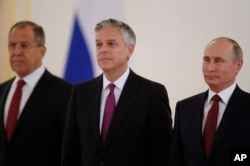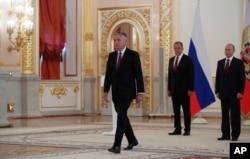Europe-based Russia experts are receiving news of Jon Huntsman's ambassadorship with a mix of skepticism and eager anticipation that strained ties between Washington and Moscow could improve during his tenure.
The new U.S. ambassador to Russia presented his diplomatic credentials Tuesday to Russian President Vladimir Putin at a Kremlin ceremony, a move that marks the beginning of his appointment.
Receiving Huntsman, Putin characterized the current state of bilateral relations as unsatisfactory, but called for "constructive, predictable, and mutually advantageous cooperation," and expressed his hope that Huntsman's arrival will mark the beginning of a new chapter in bilateral relations.
Huntsman, a former Utah governor who has twice served as a U.S. ambassador, arrived Sunday in Moscow to take over from John Tefft, who left Russia two days earlier after serving in Russia for three years, a period that was marred by a deep and rapid deterioration of ties, unseen since the end of the Cold War. The relationship soured even further in recent months following a series of expulsions of diplomats and closures of diplomatic missions.
"John Huntsman is the first ambassador of the Trump era in Russia, because the previous ambassador, John Tefft, was a career diplomat and was appointed by President Obama," said Konstantin Eggert, regular commentator and program host at independent Russian broadcaster TV Dozhd.
Speaking with VOA's Russian Service, Eggert said Huntsman's personal background differs significantly from this two immediate predecessors, which may prove a diplomatic game changer.
"Huntsman is not just a political appointee, but a person with experience that none of the previous political appointees of the last era had — neither Robert Strauss nor Michael McFaul," Eggert said.
"This is a governor, a billionaire, twice an ambassador — in Singapore and in China — and in this sense Huntsman is a person who feels very confident," Eggert added. "He has [personal and professional options] to which he can safely retreat if something goes astray with his work."
“As one of the leaders of the Atlantic Council," he said, Huntsman "is a person with political convictions.
"This does not mean that he will necessarily be an ambassador who will ideologize any of his contacts with the Russian side, but he certainly has red lines from which he will not retreat," Eggert said. "Oddly enough, some Russian 'hawks' believe those who take such tough positions are actually easier to negotiate with."
These characteristics, combined with Huntsman's Mormon background, should appeal to many top Russian officials.
"The advantages are that people in Moscow like to communicate with people who have direct access to top management — in this case, the U.S. congressional leadership," said Eggert, referring to Huntsman's high-level contacts within both the Republican and Democratic parties.
Huntsman, who once called for President Donald Trump to drop out of the presidential race, won easy confirmation as U.S. ambassador last week. He was the nation's top diplomat to Singapore under President George H.W. Bush and ambassador to China under President Barack Obama before returning to the U.S. to run for president in 2012.
Although Trump has called Russia's interference in the 2016 presidential election a hoax pushed by Democrats to sully his victory at the polls, Huntsman said at his confirmation hearing last week that “there is no question, underline, no question” that Moscow interfered. He also said he would not hesitate to remind Russian officials they are accountable for their actions.
Andrei Kolesnikov, a senior fellow and chair of the Domestic Politics and Political Institutions Program at the Carnegie Moscow Center, says all of these variables create a less optimistic outlook.
"It seems to me that, by and large, Huntsman will have little opportunity to change anything," he told VOA, citing prevailing diplomatic turmoil between the countries. "He's almost at an impasse before he starts his work, because relations are currently so fraught with mutual suspicion and tension that the groundwork for any meaningful improvement is absolutely minimal."
Huntsman comes into office with a drastically reduced staff after the Russian Foreign Ministry ordered the U.S. to cut its embassy and consulate staff in Russia by 755, or by two-thirds, heightening tensions between Washington and Moscow after U.S. Congress approved sanctions against Russia. In response, the U.S. suspended issuing non-immigrant visas in Moscow for a week in August and stopped issuing visas at its consulates elsewhere in Russia.
Relations between Russia and the United States cooled following Russia's annexation of Crimea in 2014 and its support for separatists in eastern Ukraine, where fighting since 2014 has left 10,000 people dead. Reports of Russian meddling in the 2016 U.S. presidential election put a further damper on hopes for better ties that the Kremlin had pinned on Trump's presidency.
In August, the U.S. adopted a new package of stiff financial sanctions, aimed at punishing Moscow for interfering in the election and for its military aggression in Ukraine and Syria, where the Kremlin has backed President Bashar al-Assad.
This story originated in VOA's Russian Service. Some information used in this report came from AP.






